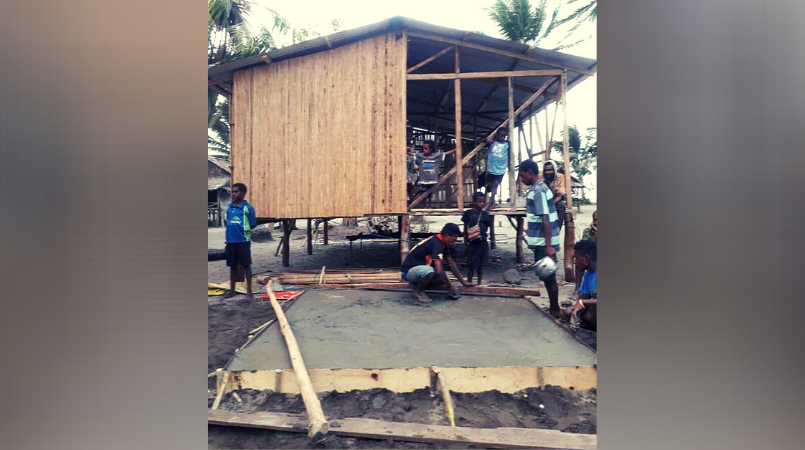
One of the most significant impacts of the recent 7.3 magnitude earthquake that struck off the coast of Morobe has been on water supplies and village wells.
In many villages dotted along the Northern Beaches of Northern Province, wells were emptied or destroyed while other local water sources polluted by upriver debris during the quake.
Without access to their regular source, communities faced the option of walking to their nearest clean water source, or risk relying on brackish, potentially contaminated water. In addition to facing damage to some of their houses, women from the village of Killerton were having to walk along the coast to Sananada to fetch water for their families.
Kokoda Track Foundation, an Australian NGO that has been working in the region for over a decade, swung into immediate action on breaking news of the quake. Their team, based in Popondetta and at the Kokoda College in Kou Kou, worked with an extensive network of teachers and health workers along the Kokoda Track catchment and through to the Northern Beaches to quickly ascertain impact and how best to assist. Reports filtering back highlighted that access to water was critical for hygiene, drinking, cooking and maintaining gardens. A rapid response plan was put in place.
Of the decision to help the communities, KTF CEO Dr Genevieve Nelson said: “We were absolutely devastated to hear the reports from our contacts across the province. Oro is our heartland, her people are our friends. There was no question that we had to find a way to help. With the generous financial support of our counterparts at No Roads Foundation, we were able put a plan into action to help restore water supplies, one of the most basic human needs.”
The close partnership between KTF and No Roads Foundation expedited response activities.
Stewart Kreltszheim, Chair of the No Roads Foundation, stated: “The amazing relationship the No Roads Foundation has with KTF has once again proven to be critical when time is of the essence.
“KTF's presence on the ground and the logistical capacity to move quickly in an extremely challenging environment has provided immediate relief and will help these communities recover. I have been in regular contact with these communities and they are extremely grateful for the work being done by our two foundations. To Gen and team - a heartfelt thank you!”
Sourcing supplies in Port Moresby and Popondetta, including portable water tanks for ease of transport by vehicle and boat, the KTF team have worked with local communities to plan restoration of village water sources. The immediate response involved distributing water collection containers to impacted households to enable them to gather water from the nearest available clean source, for use until permanent tanks could be installed.
With community consultation, locations for the installation of water tanks were identified; central, accessible and nearby buildings suitable for catchment during rains. Concrete slabs were installed, tanks assembled and attached to nearby buildings with newly-fitted guttering. The villages of Killerton, Sanananda, Buna, Garara, Gona and Gewoto had 10,000 or 4,800 litre tanks installed, or both, according to need based on the extent of damage to their supply.
Working with the affected communities, KTF's Grayson Kaumi highlighted what the tanks mean to those he has been working alongside in the Killeton and Garara community.
“The people are very happy to have these tanks. This has made life easier for women and children, saving time and distance they normally walk every day.”
With three-weeks of continuous work drawing to a close, Kaumi and the team are finalising installations so the villages will again have access to a reliable, nearby fresh water sources by the end of the week.
(Community assists with tank slab)
